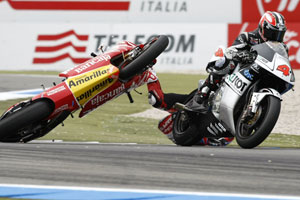Alex Gobert’s RRPA looks at ways to bounce back to your best and how to rebuild confidence after crashing your road bike.

RACE WEEKENDS
You’ve probably seen racers crash and quickly run back to their spare bikes in the case of a restart, and they usually get straight back on the pace like nothing ever happened.
Only the most experienced racers can truly do this in complete control, and that is because with the amount of crashes they’ve had during their careers they’ve learnt to quickly process the information on why they crashed.
The bonus for these guys is that they either have a spare bike ready to roll or have world class mechanics at the ready to fix their crashed bike quick enough to get them back out on track safely.
If you’re a privateer national racer or a club day competitor, make sure that your bike is in a safe running order, but if you don’t have enough time to put the bike back together properly then just sit out the race and take that extra time.
It’s not the ideal situation, but being safe and confident is better than being sorry and sliding down the road again.
Have you had a crash or a major scare and simply haven’t been able to find confidence again? This is a very common occurrence and one that not only makes riders slower, but also even turns some riders away from two wheels altogether.
One thing to keep in mind when riding motorcycles is that it’s very likely that one day in your lifetime you are going to have an accident, whether it be your fault or somebody else’s, at the track or in a car park.
It’s this element of danger that tells our brain to control how fast we go, with the intelligent riders on the road always riding smarter, essentially being much safer with fewer risks along the way.
But we can’t predict when we will hit the deck, and the way you recover from an accident is the vital thing in order for you to keep on enjoying motorcycle riding at the level you did before the accident.
After you’ve fixed your bike, checked your safety riding gear, and have recovered from any injuries sustained in the fall (which hopefully there aren’t any), the best bet to regain confidence is to thing about the events leading up to the crash.
How did it happen? Did you crash through a rider error or mechanical problem with the bike? Was there any way to avoid it? Were there any other parties involved? Did you have a lapse in concentration?
All of these questions could lead to you realising why you came off, and knowing exactly what it was that made you fall will be the first step to rebuilding your confidence.
In fact, we all learn from our mistakes, and in this case, you want to ensure that you don’t make the same mistake ever again – that’s why we should never fall the same way twice.
After you’ve figured out exactly what it was that caused you to crash, you then want to climb back aboard the bike and ease into it again. You don’t want to get on and go like a maniac, you want to get on and inspect the bike and get a feel for it before you work up to speed.
Once your satisfied with your bike, begin to push that little bit harder and get a feel for the tyres, squeeze the brakes hard and accelerate harder – all on purpose so you can effectively get a feel for the bike at speed again.
If you had a front-end crash and simply lost grip, try to brake less and roll through the corners faster, focussing on your front grip so you can regain faith that your tyre will stick to the road.
If you lost the rear-end, keep your mind on how the rear tyre reacts when you’re under acceleration, also consciously feeling how the suspension reacts as you gain confidence.
In a completely different scenario where you were run off the road by a car or truck, the only real improvement you can make here is by adjusting your judgment of how close to go to other vehicles or where you should be situated on the road.
Speed is a major factor in many accidents, so if you simply put your crash down to going too fast then ease it up a bit and ride within your limits, building up to ride faster when you’re more experienced.
Wet weather is also a massive contributor to accidents, and as funny as it sounds, I believe if you crash in the wet your best bet is to go back out next time it rains and face your fears at your own will.
That way, in case you’re out on a long ride and it starts pouring you can always relate to your comeback ride when you chose to do it, and reduce risks in your rain riding.
And what about those times when you simply can’t work out what made you fall off? This is often the case, and it’s these cases that really punish your confidence the most.
My advice is to tentatively do all of the drills mentioned above, thinking absolutely everything over in your mind and being extra careful in your confidence building process.
The most important point in all of this is that anytime you get on your bike, you need to be confident in your own ability and also confident in your equipment. Any doubts can lead to costly mistakes, which could lead to ever more crashes.
If you’ve crashed and are eager to go for another ride, don’t simply shrug it off and go riding again, think it through and you’ll only become a better rider over the long term.Kids in America ipod






